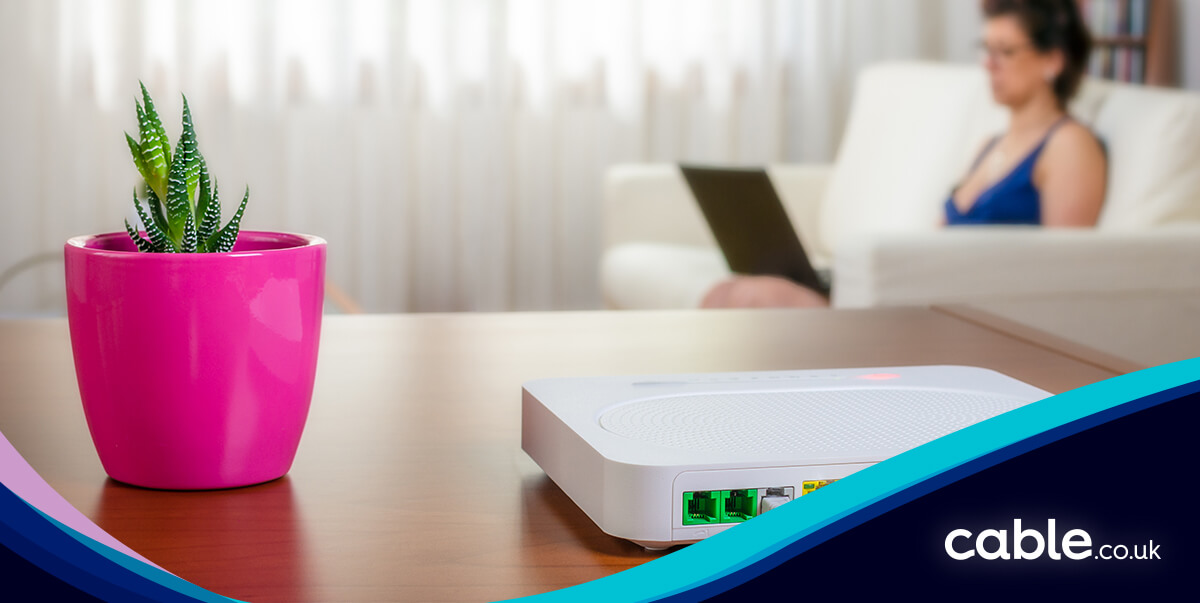Dan Howdle | Updated June 7th, 2022
What is ultrafast broadband?
You've heard of superfast broadband, but now along comes ultrafast. Believe it or not these terms aren't just marketing fluff and actually have very specific definitions. So what is ultrafast? Do you need it, and can you actually get it?

As the name suggests, ultrafast broadband is an incredibly quick broadband connection – a lot faster than your typical superfast broadband deal, in fact. But there's a little more to it than that, as you're about to find out.
What is ultrafast broadband?
The definition of ultrafast
To define ultrafast broadband we must also define the other types of broadband you'll commonly find out there. That way we can get a sense of scale as to how much faster it is than the typical broadband deal.
Standard ADSL broadband is a connection with a speed of less than 24Mbps (megabits per second) that arrives at your property without the use of fibre optic cables. So-called 'superfast' broadband offers speeds of 24Mbps or more, and less than 300Mbps via cables that are fibre optic part of the way to your property. 'Ultrafast' broadband is a connection with speeds of more than 300Mbps, but less than 1Gbps (one gigabit per second, or 1000Mbps) and is typically delivered via fibre optic cables running the entire route between your house and the nearest exchange.
The 1Gbps top speed, still categorised as 'ultrafast', is also sometimes also known as 'gigabit broadband'.
How fast is ultrafast broadband in real terms?
A lot of providers will sell you their broadband speeds on how much you can download and stream, and how quickly you can do it.
- Standard ADSL broadband (10Mbps-11Mbps) – Stream between one and two HD movies at the same time
- Superfast broadband (35Mbps-213Mbps) – Stream between four and 30 HD movies at the same time
- Ultrafast broadband (362Mbps-1000Mbps) – Stream between 50 and 150 HD movies at the same time
If you're looking at those numbers and thinking 'Why on earth would I ever want internet fast enough to stream over a hundred movies at once?' then you are asking the right question: Do you really need it?
Do I need ultrafast broadband?
Need? Almost certainly not. This question really comes down to whether or not you want it. Your average British household doesn't actually need all that much speed. Everyday uses such as surfing the internet or streaming movies and TV only start to tax your average connection when a few people in the household are doing them at the same time.
However, there are some special cases where an ultrafast connection might be desirable (if not absolutely necessary). If one or more people in the household is a gamer who regularly downloads their games from the internet, having a fast connection means doing so will take less time. Likewise if there are members of the household who like to stream movies and TV in 4K (a very high-definition screen resolution only available to the latest TVs), a faster connection is better.
However, even if these things occur regularly in your household, a superfast fibre connection is probably going to be enough. We generally don't advise ultrafast for your average household, but if it's something you want, then by all means get it.
-
 £75 gift cardBroadband Ultrafast
£75 gift cardBroadband Ultrafast- 145Mb average speed +
- Unlimited usage +
- PAYG calls
- No set-up fees (save £19.95)
- £75 gift card
£33 per month£75 gift card£0 one-off cost18 month contract -
 £50 Reward CardFull Fibre 900
£50 Reward CardFull Fibre 900- 900Mb average speed +
- Unlimited usage +
- No phone line
- £50 Virtual Reward Card
£55.99 per month£50 Reward Card£29.99 one-off cost24 month contract -
 £50 Reward CardFull Fibre 500
£50 Reward CardFull Fibre 500- 500Mb average speed +
- Unlimited usage +
- No phone line
- £50 Virtual Reward Card
£45.99 per month£50 Reward Card£29.99 one-off cost24 month contract
Compare broadband deals
Who offers ultrafast broadband?
A lot will depend on where you live and whose side you are on when it comes to defining the word 'ultrafast'. Virgin Media is one of the only providers to offer true speeds over 300Mbps – the accepted minimum to be labelled ultrafast according to Ofcom – while BT labels its own fibre optic broadband packages 'Full Fibre'. Sky Broadband calls its fastest broadband ‘ultrafast’, but average speeds are only up to 145Mbps, not meeting the criteria for ‘ultrafast’ broadband set by Ofcom. There are also a number of much smaller providers which offer even faster speeds, but only to very specific locales.
- Virgin Media – The only widely-available provider to offer true ultrafast speeds (greater than 300Mbps). Virgin Media still only covers around 75% of UK homes right now, though, so you'll need to check if you can get it
- BT – Labels its Full Fibre 300 and Full Fibre 900 fibre optic broadband packages 'ultrafast'. BT has begun has recently rolled out true ultrafast broadband, but availability is currently very limited, and true average speeds with BT’s fibre optic broadband packages offer an average speed of 67Mbps.
- Hyperoptic and others – Some smaller providers use their own-built fibre networks to offer speeds of up to 1Gbps. The most notable of these is Hyperoptic, which continues to expand its network. While it's still very unlikely you can get it, it's the most likely of these smaller firms.
Can I get ultrafast broadband?
With Virgin Media the only widely-available ultrafast broadband provider, you should use our Virgin Media postcode checker to see if you can get it. Failing that, there is a slim chance you may be able to get ultrafast broadband from BT or Hyperoptic, but if none of these are available, you can use the button below to browse the fastest deals where you live.
Our experts are available from 10am-6:30pm Monday to Saturday
Frequently asked questions
Fibre broadband comes in two types: FTTC and FTTP. FTTC stands for 'fibre to the cabinet', meaning the fibre optic cable goes from the exchange to your nearest green cabinet, with the remaining distance (known as the last mile) between the cabinet and your house being made of copper. FTTP stands for 'fibre to the premises' and means the line is fibre all the way.
Copper slows down the maximum possible speeds considerably, where fibre allows for very fast connections. FTTP therefore, is capable of much faster speeds than FTTC. However, the term 'ultrafast' describes speeds between 300Mbps and 1000Mbps and is not specific to either technology.
Yes. Virgin Media is the only provider to offer true ultrafast broadband (over 300Mbps. BT does offer packages over 300Mbps+ but speeds this high are not widely available yet.
Virgin Media. There are some smaller, faster providers available in spits and spots up and down the country, but Virgin is the only ultrafast provider you're likely to be able to get.